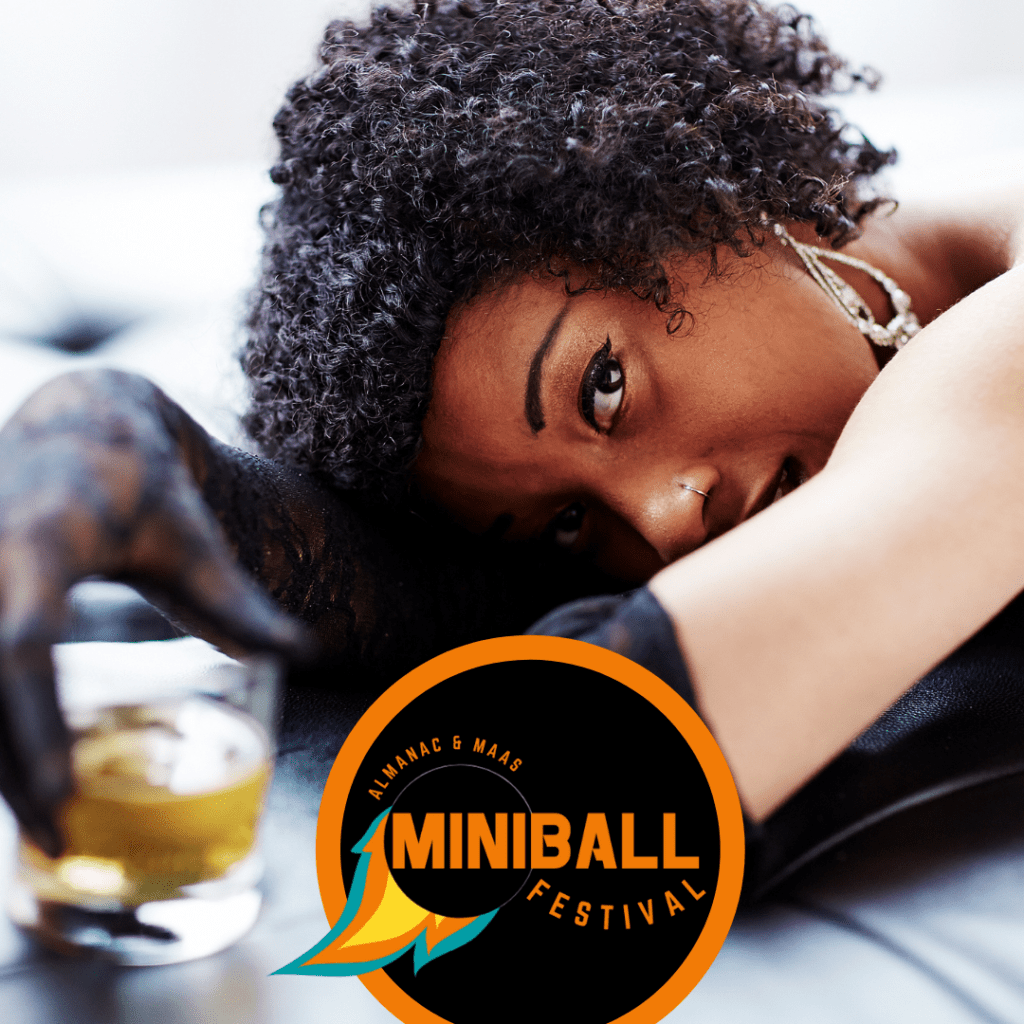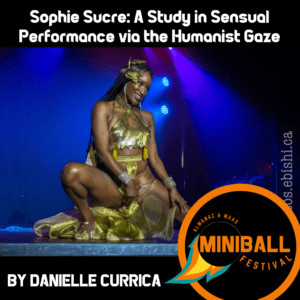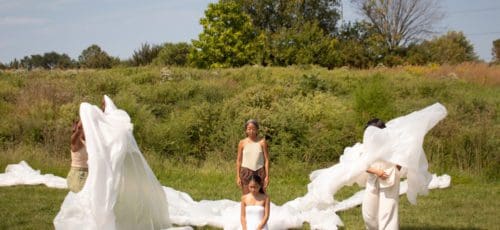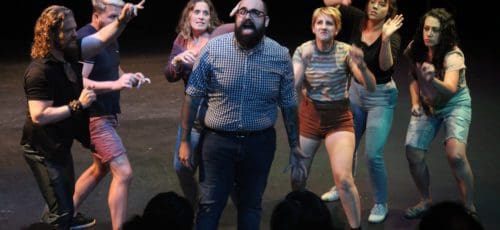Interview with Danielle Currica aka Sophie Sucre
Danielle Currica, otherwise known as her persona Sophie Sucre, has been a performer in Philadelphia’s burlesque scene since 2009, and is putting on her first self-produced show, Sophie Sucre: A Study in Sensual Performance via the Humanist Gaze, in Miniball Festival April 3 – 5, which will be a long-form 45 minute burlesque act about her exploring her own sensuality. We chatted with Danielle over Zoom about her evolution as a burlesque artist, the Philly burlesque scene, and what she loves most about performing.
FringeArts: How were you introduced to burlesque?
DANIELLE CURRICA: When I was still in college at VCU in Richmond, Virginia, I had started to hear about burlesque as a means of performance, but I didn’t really know much about it. I think the closest I understood was it was something like Moulin Rouge, something that involved cabaret and that experience, but I didn’t know much about it. I moved to Philadelphia, and a woman by I knew was already dancing for a troupe here in the city of Philadelphia called the Peek-a-Boo Revue, and they were hosting auditions and she was the one to tell me to go and audition. And so I did, and I got in, but the troupe’s whole setup was very much like a jazz-dance company. You were rehearsing in studio spaces, you were performing on proscenium-style stages. I was learning the choreography as a chorus member, I wasn’t doing any solo work, so it really didn’t dawn on me what burlesque was until I got to our tech rehearsal, and by tech rehearsal I mean day-of-show in the venue, like watching people run through their acts, and I was like “Ohhh, this is what burlesque is.” And then once my brain melted and resolidified, I was like, “Wait, this is really cool, this is a cool experiment in terms of agency and power.” It was really amazing to watch the performers and the troupe who by that point had been doing burlesque [for] ten years—watching them really turn the space over to their space, and get an entire audience to hold attention and be interested in what’s going to happen and how it’s going to happen.
From joining the troupe I started doing research about burlesque and burlesque history, as I was trying to find myself. The city of Philadelphia was a predominantly white scene at the time, when I joined in 2009, and so there really weren’t too many other [women of color in the scene]—there was a time where I was one of very few or one of the only Black burlesque performers in Philadelphia, let alone the troupe.
Luckily that is no longer the case—the city of Philadelphia has an incredibly diverse and vast scene now. I love that that is no longer the case, but I definitely had to start doing some research to find my way, to find who I might be or who I might evolve into, but I wanted to see myself reflected back, to have a sense of what was the history or the legacy of this in terms of Black people doing it, and that took some time. Luckily, I met other performers like Chicava Honeychild, who’s based in New York. She is a burlesque historian who is one of my great teachers in terms of Black burlesque and how to find that history, in things like the Jet magazine archive, and other content that she had collected and archived over the years. Since then it’s just been me doing my own research, getting to know other performers, trying to perform in places other than Philadelphia, always trying to understand the history of the areas and spaces that I’m in, and what history may already exist of other Black burlesque performers who already passed through the space.
What has been your favorite part of it over the years?
I love the performer that I’ve grown into, I think that’s my favorite part of it. I mean, the artist in me is in love with getting to design costumes, learning to do makeup, and really truly paint in the way that I think drag queens have turned into an artform, that really specific type of painting. But getting to evolve as an artist, how I perform, how I make connections with my audience, how I find a way to share a narrative that isn’t always linear, or isn’t always tangible, or it may sometimes start as one thing and end as another, that probably is my most favorite aspect of burlesque, is just getting to tell stories, whatever the story is, and the person that I’ve seemed to grow into over these last 13 years of performing in this style.
Are there any least favorite parts?
I think the industry is still building a rapport and etiquette with our audience around boundaries and autonomy. So I think we as a society have been socialized to engage with the public display of eroticism with ownership and lack of autonomy.It’s important for me that the audience understands that even if I’m displaying my eroticism at its fullest, I’m still a human, I’m still someone that has autonomy and boundaries. Getting my audience to understand that, that growing curve, is not fun, but it’s a part of it and I’m okay with making those clear boundaries with my audience, when necessary.
You kind of already answered my other question, but do you design your own costumes?
Some of them! Some of them I am very blessed to have friends who are amazing costumiers, and they have made costumes in design with me, which I come with an idea or a concept and they build the design. Some of my costumes I do design myself, I mean but that’s kind of part of, you kind of have to in burlesque at some point create or design something of your own because oftentimes you’re taking things; disparate pieces and pulling them together to make one cohesive look, or you’re buying a base, or you’re buying a robe, and you’re building around it. So, regardless of your knowledge of sewing and costuming and fashion design, you’re still going to be designing things. But I enjoy it, it’s been a great learning experience.
What advice would you give someone looking to enter burlesque?
Be confident in being bigger than you think you need to be. Be comfortable in being your biggest and brightest self, whatever that means. It’s probably the thing that you probably turn down, like you turn down in level of showiness or fullness, sobe comfortable turning those things all the way up. Be comfortable in that skin and create a network for yourself of people that you appreciate, that you trust, that inspire you and push you, so that you always have a small community around you that helps you feel grounded in the choices that you’re making, that affirm the choices that you’re making. But also they give you that additional consideration or things that you may not see or think. A small group of colleagues, artists, friends, loves, that you feel safe to share that with, definitely.
Do you have a favorite venue that you’ve ever performed at?
I have to say, I feel really lucky as a burlesque performer to have gotten to perform on the Trocadero stage, before the Trocadero shut down here in Philly. It shut down in 2019 I think or 2020, right before the pandemic, and that was an original burlesque house, soI feel incredibly incredibly honored to have gotten toperform on that stage,where the burlesque legends of the golden era got to perform.
What can you tell our readers about Sophie Sucre: A Study in Sensual Performance via the Humanist Gaze?
So I’ve never produced my own self-produced work before, this is the first time I’ll be presenting anything as an artist Danielle outside of Sophie Sucre in a burlesque setting. This is, as much as it is a performance experience as well as an experiment in how far down the rabbit hole I’m willing to go in terms of pleasure center exploration—in terms of breaking this persona that is “Sophie,” and finding where Danielle starts and Sophie ends, in terms of my self expression, my way of finding autonomy, my way of finding my most powerful self.
I hope people feel the same levels of excitement and humor and titillation and sensation that I try to explore. As far as me, as an artist, is concerned, we’ll see where this goes from here. I mean, I have no idea what to expect, I didn’t know that I’d have this wonderful opportunity, so I’m just very excited to put it forth and grateful for the opportunity and the experience.
Catch Sophie Sucre at Miniball Fest April 3-5. Purchase tickets here. Interview conducted by Jack Brummett, Communications Intern.




